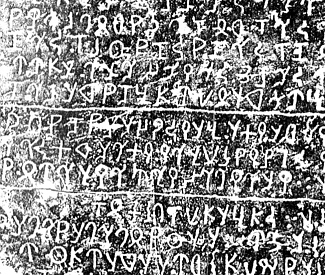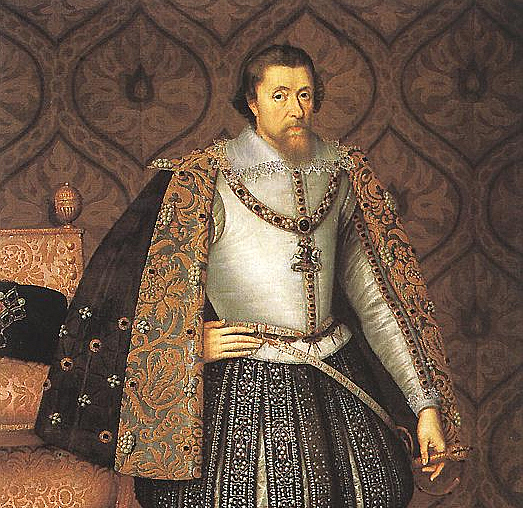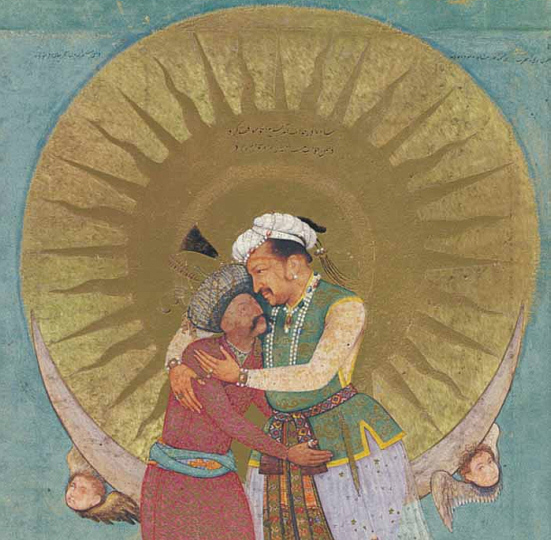

Zitierweise / cite as:
Payer, Alois <1944 - >: Quellenkunde zur indischen Geschichte bis 1858. -- 15. Frühe europäische Quellen und Quellen aus der Zeit der East India Companies. --11. Zum Beispiel: Briefwechsel zwischen King James I. und Großmogul Jahāngīr (نور الدین جهانگیر). -- Fassung vom 2008-06-07. -- http://www.payer.de/quellenkunde/quellen1511.htm
Erstmals publiziert als:
Roe, Thomas <1581?-1644>: The embassy of Sir Thomas Roe to India, 1615-19, as narrated in his Journal and correspondence / edited by William Foster [1863 - 1951]. -- New and rev. ed. -- London, Oxford University Press, 1926. -- lxxix, 532 S. : Ill. ; 19 cm. -- S. 502 - 505
Erstmals hier publiziert: 2008-06-07
Überarbeitungen:
Anlass: Lehrveranstaltung FS 2008
©opyright: Public domain.
Dieser Text ist Teil der Abteilung Sanskrit von Tüpfli's Global Village Library
Falls Sie die diakritischen Zeichen nicht dargestellt bekommen, installieren Sie eine Schrift mit Diakritika wie z.B. Tahoma.

Abb.: King James I of England / von Paul van Somer, um 1603/13 [Ausschnitt]
[Bildquelle: Wikipedia, Public domain]
(Purchas's Pilgrimes, vol. i, p. 580.1)
1 From a copy found by Purchas among Hakluyt's papers.
The Kings Letters sent to Selim Shagh,2 the Great Mogor, in the yeare 1614[-15] by Sir Thomas Roe.
James, by the Grace of Almightie God, the Creator of Heaven and Earth, King of Great Britaine, France and Ireland, Defendor of the Christian Faith, etc.
To the high and mightie Monarch the Great Mogor, King of the Orientall Indies, of Chandahar, of Chismer and Corazon, etc. Greeting.
We having notice of your great favour toward us and our subjects, by your great firma [farmān] to all your captaines of rivers and officers of your customes, for the entertaynment of our loving subjects the English nation with all kind respect, at what time soever they shall arrive at any of the ports within your dominions, and that they may have quiet trade and commerce without any kind of hinderance or molestation, etc., as by the articles concluded by Sue Suff,3 Governour of the Guzerats, in your name, with our loving subject Captaine Thomas Best appeareth : have thought it meete to send unto you our ambassadour, which may more fully and at large handle and treate of such matters as are fit to be considered of, concerning that good and friendly correspondence which is so lately begunne betweene us, and which will without doubt redound to the honour and utilitie of both nations. In which consideration, and for the furthering of such laudable commerce, wee have made choice of Sir Thomas Roe, Knight, one of the [S. 503] principall gentlemen of our court, to whom wee have given commission under our great seale of England, together with directions and instructions further to treate of such matters as may be for the continuance and increase of the utilitie and profit of each others subjects : to whom we pray you to give favour and credit in whatsoever hee shall moove or propound toward the establishing and enlarging of the same. And for confirmation of our good inclination and wel-wishing toward you, we pray you to accept in good part the present, which our said ambassadour will deliver unto you. And so doe commit you to the mercifull protection of Almightie God.
2 Salīm Shāh, the Emperor's proper name, He is, however, always known by the title of Jahāngīr, which he assumed upon his accession to the throne.
3 Shaikh Yusuf.

Abb.: Jahāngīr [نور الدین جهانگیر] (rechts) und Shāh Abbas [عباس ] I von
Persien / von Abu al-Hasan, 1620 [Ausschnitt]
[Bildquelle: Wikipedia, Public domain]
(British Museum : Add. MS. 4155, f. 100.)1
1 This is the document mentioned in the ambassador's letter to King James of 15 Feb. 1(118 (see p. 405). The text here given is from a copy in Roe's handwriting, and may therefore be accepted as authoritative. Mr. Sainsbury has printed a slightly different version in the preface to his Calendar of State Papers, E. Indies, 1617-21, taken from an undated copy in the Public Record Office (C.O. 77, vol. i., No. 68); a third copy, also presenting some unimportant variations, is in Add. MS. 29975 (f. 37); and a fourth (as also a French version) will be found among the State Papers, Foreign (vol. 40), at the Public Record Office. There is further, among the Marquis of Salisbury's MSS. at Hatfield, a document containing (as Mr. R. T. Gunton was kind enough to ascertain for me) copies of both this and the following letter on a single sheet, endorsed, 'Two letters from the Great Mogol to his Majesty, 1619' ; and yet another copy of the two is among the Carte MSS. in the Bodleian Library (No. 103, f. 280). Terry quotes the opening lines of both, and says (not quite correctly) that one was written a year before the other.
When Your Majestie shall open this lettre, lett your royall hart bee as fresh as a sweete garden. Lett all people make reverence at your gate ; lett your throne bee advanced higher ; amongst the greatnes of the kyngs of the prophett Jesus lett Your Majestic bee the greatest, and all monarchques derive their councell and wisedome from your brest as from a founteyne, that the law of the majestic of Jhesus may revive and flourish under your protection.
These salutations are much amplified in phrases in the originall.2
2 These are, of course, marginal comments by the ambassador.
The lettre of love and frendship which yow sent and the presents, tokens of your good affection toward mee, I have received by the hands of your ambassador, Sir Thomas Roe (who well desserveth to bee your trusted servant) delivered to mee in an acceptable and happy houre ; upon which myne eyes were so fixed that I could not easelye remoove them to any other object, and have accepted them with great joy and delight.
Upon which assurance of your royall love, I have given my generall command to all the kyngdomes and ports of my dominions to receive all the merchants of the English nation as the subjects of my frend ; that in what place soever they choose to live they may have reception and residence to their owne content and safety, and what goods soever they desire to sell or buy, they may have free libertie without any restraynt; and at what port soever they shall arrive that neyther Portugall nor any other shall dare to molest their quiett; and in what cytty soever they shall have residence, I have commanded all my governors and capteynes to give them freedome answerable to their owne desires : to sell, buy, and to transport into their countrie at theire pleasure.
For confirmation of our love and frendship, I desire Your Majestie to command your merchants to bring in their shipps of all sorts of rareties and rich goods fitt for my pallace ; and that yow bee pleased to send mee your royall lettrs by everye oportunitie, that I may rejoyce in your health and prosperous affayres; that our frendship may bee enterchanged and eternall. Your Majestie is learned and quicksighted as a prophett and can conceive much by few woords, that I neede write no more. The God of Heaven give yow and us increase of honor.
Written in Amadavaz, the cheefe cytty of Guzuratt, sealed in a case of gould satten, sent to the ambassador the 20 day Feb. 1617[-18] (the coppy firmed by the secretarie), in answere of a lettre by His Majestic of Great Brittayne dated 1616[-17] ; which should have beene sent for England by the fleete returned in March 1617[-18], but deteyned because ther was nothing performed according to the contents therof, that therby the ambassador might urdge the Kyng of Indya to performance, or refuse the lettre.
Zu: 12. Zum Beispiel: Edward Terry, 1616 - 1619